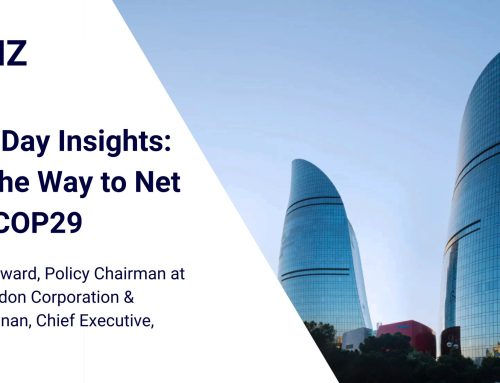Net Zero at the Labour Party Conference
“Growth” was a major theme at the Labour Party Conference, emphasising the importance of fostering sustainable growth that balances economic development with environmental responsibility.
Whilst this messaging is music to our ears, from our discussions with civil society organisations there is a sense that engagement from Treasury ministers was relatively low, raising concerns about the priority given to this issue on the agenda. Unwavering support from Treasury on the financial mechanisms to encourage green growth is fundamental.
B4NZ Priority Areas & Discussions at Party Conference
SMEs
B4NZ’s Head of Policy, Elena Pérez Celis, and COO Hannah’s Cool spoke at the Labour Conference and the Conservative Conference, respectively, on the importance of open data ecosystems. This aligns with the Perseus programme, which aims to establish frameworks for automated emissions reporting and unlock green finance for UK SMEs. B4NZ is leading discussions on open data ecosystems to drive decarbonisation. Through the Perseus programme, B4NZ aims to set frameworks for automated emissions reporting, facilitating SME access to green finance and supporting targeted decarbonisation efforts. It was encouraging to engage in numerous discussions that highlighted the vital role of SMEs in the transition, as well as the significance of open data structures in facilitating this process.
Retrofits
The Department for Energy Security and Net Zero announced two schemes: the Warm Homes: Social Housing Fund and Warm Homes: Local Grant. These will provide funding to councils and registered providers to address fuel poverty and boost home energy efficiency.
Energy Secretary Minister Ed Miliband also outlined plans to reinstate energy efficiency standards for rented homes, aiming for a minimum EPC band ‘C’ by 2030. Final details of the Warm Homes Plan are expected post-Spending Review, though delays could impact the April 2025 launch of key energy programs, potentially risking low participation and a slower rollout.
However, concerns about potential delays in launching critical energy efficiency programs, particularly for retrofits, present a risk to the timely execution of the Warm Homes Plan.
The need for financial mechanisms has never been greater. We need EPCs that reflect the actual energy performance of a building so that we can unlock finance towards retrofits at scale. B4NZ is also actively advocating for EPC reform and is looking forward to engaging in the recently announced upcoming consultation.
Agriculture
During the conference, concerns were raised about the Department for Environment Food and Rural Affairs’s (Defra) £358 million farming budget underspend, with warnings that the department risks failure if not addressed.
This shortfall could hinder efforts to decarbonise agriculture, a sector responsible for 11% of the UK’s emissions. Additionally, some of the discussions centred around whether Defra can manage the capacity to effectively tackle agricultural emissions and is constrained by external pressures, limiting its ability to take decisive action on climate goals within the sector. Therefore, further questions remain about Defra’s ability to meet emissions targets in agriculture due to budget constraints and internal challenges.
Nature
In his recent foreign policy speech, UK Foreign Secretary David Lammy announced the establishment of a Global Clean Power Alliance to accelerate the transition to renewable energy and reduce reliance on fossil fuels. He highlighted the climate crisis as “the most fundamental threat” facing the world and criticized Prime Minister Rishi Sunak’s government for its “cynical disdain” towards international climate diplomacy and for retreating from its leadership role in global development.
Lammy pledged to appoint new climate and nature envoys to represent the UK at international events, with Rachel Kyte appointed as the climate envoy, given her experience as the former CEO of the Sustainable Energy for All Initiative. Additionally, UK government appointed Ruth Davis, a prominent environmental campaigner, as its inaugural Special Representative for Nature.
The recent announcements and discussions around nature-positive investment provide a foundation for B4NZ’s Nature Finance Workstream. B4NZ is engaging in multiple discussions at COP16 to continue mobilising capital toward sustainable nature solutions and facilitating investments in biodiversity projects.
Overall, Labour’s announcements reflect opportunities to accelerate green growth through open data initiatives, standardising emissions reporting for SMEs, and increasing housing energy efficiency. These policies could pave the way for enhanced green finance accessibility and energy cost savings across the UK.
Net Zero at the Conservative Party Conference
The Conservative Party Conference discussions were primarily dominated by the ongoing leadership campaign, with limited focus on environmental issues, despite polling suggesting strong voter support for climate action.
Robert Jenrick
Jenrick advocates for decarbonisation with caution, suggesting that the UK should not strive to lead globally but should instead decarbonise at a comparable pace with major competitors. He voiced concerns over ambitious net-zero targets and expressed opposition to solar farms on greenbelt land.
Kemi Badenoch
Badenoch, a self-described net zero sceptic, has consistently pushed for slower intervention in net zero policies. At the conference, she underscored the need for a renewed party direction before introducing further climate policies.
With some frontrunners adopting a critical stance on net zero, there’s a risk of polarising the issue within the party, potentially slowing the progress needed for the UK’s climate goals. As candidates shift right to attract disaffected voters, the commitment to climate action could be deprioritised, threatening the UK’s leadership in the green economy.
Contact
Elena Pérez Celis,
Head of Policy & Public Affairs



